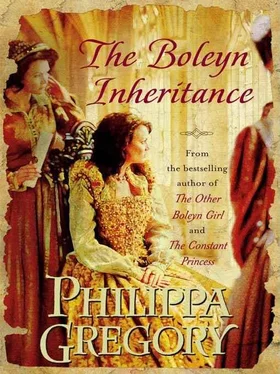A page in Norfolk livery is idling outside the queen’s rooms. He passes me a folded note, and I step into one of the window embrasures. Outside, the garden is bobbing with yellow Lenten lilies, daffodils, and in a chestnut tree that is studded with fattening sticky buds there is a blackbird singing. The spring is coming at last, the queen’s first spring in England. The summer days of picnics and jousts and hunting and pleasure trips, boating on the river and the summer progress around the great palaces will start again. Perhaps the king will learn to tolerate her; perhaps she will find a way to please him. I shall see it all. I shall be in her rooms, where I should be. I lean against the polished paneling to read my note. It is unsigned, like every note from the duke.
The king will keep company with the queen only until the moment that France quarrels with Spain. It is agreed. Her time with us can be measured in days. Watch her. Gather evidence against her. Destroy this.
I look around for the boy. He is leaning against the wall and idly tossing a coin, catching one side up and then the other. I beckon him to me. “Tell your master that she wants the princesses at court,” I say quietly in his ear. “That is all.”
Katherine, Hampton Court,
March 1540
The king is most angry at dinner tonight. I can tell from the way that he leads in the queen and does not glance over to me as he usually does. I am sorry about this because I have a new gown (another one!) in creamy yellow, and it is gathered under the bust so that my breasts are on display in the most ravishing and shameless way. But it is a waste of time and trouble trying to please a man. When you are at your very best, his mind is elsewhere, or when he agrees to meet you, he has to go off somewhere else, with less than half a decent excuse. Tonight, the king is so cross with the queen that he hardly looks at me, and I have wasted my new gown for nothing. On the other hand, there is a most delicious young man sitting at the Seymour table who is clearly appreciating the gown and the contents; but I have no time for young men anymore, sworn as I am to a life of self-denial starting this Lent. I see Tom Culpepper trying to catch my eye, but I don’t even look at him. I will not easily forgive him for promising to meet me and then failing me. I shall probably live and die a spinster, and it will be his fault.
Why the king is angry, and what she has done, I don’t know until after dinner when I go up to the table to take her a handkerchief that she had embroidered to give to the king. It is a new fashion and very elegant. She certainly can sew. If a man prized a wife for her sewing, she would be his very favorite. But she never even gives it to him, for as I come up he suddenly turns to her and says: “We shall have a merry court for Easter.”
She would have been better advised to say yes, and leave it at that. But she says, “I am glad. I wish for the Lady Elizabeth and the Princess Mary to come to court.”
He looks furious, and I see her hands grip together on the table before her. “Not the Lady Elizabeth,” he says gruffly. “You should not wish for her company nor she for yours.”
This is too fast for her and I see her puzzled little frown, but she understands well enough that he is saying no.
“Princess Mary,” she says quietly. “She is my stepdaughter.”
I can hardly breathe, I am so amazed at her daring to reply. Fancy having him snarl at you like that and then standing your ground!
“I cannot think why you should want to summon a determined Papist to court,” he says icily. “She is no friend of your faith.”
The queen understands the tone well enough even if she does not quite comprehend the words.
“I her stepmother am,” she says simply. “I guide her.”
He gives a sharp bark of laughter, and I am afraid of him, even if she is not. “She is all but your own age,” he says unkindly. “I don’t think she will want any mothering from the likes of you. She was mothered by one of the greatest princesses of Christendom, and when I parted them they defied me rather than huddle together for love. D’you think she will need a girl her own age to take care of her? When she and her mother let death part them rather than deny their faith? D’you think she’ll want a mother now who can’t even speak English? She can talk to you in Latin or Greek or Spanish or French or English, but not German. And what do you have? Oh, yes, only High German.”
I know I should say something to distract his temper, but he is so spiteful and so sharp that he frightens me. I can’t say anything; I stand there like a fool and wonder how she can find the strength not to faint in her chair.
She is flushed scarlet with embarrassment, from the neck of her gown to her heavy hood; I can see the blush under her muslin shift and under the collar of gold and her neck piece. It is painful to see her embarrassment before his anger, and I wait for her to burst into tears and run from the room. But she does not.
“I learn English,” she says with quiet dignity. “All the time. And I her stepmother am.”
The king gets up from the table so fast that his heavy gold chair scrapes on the floor and almost tips over. He has to steady himself on the table. His face is red, and there is a pulse beating at his temple. I am half dead of terror just looking at him, but she is still seated, her hands gripped together on the table before her. She is like a little block of wood, rigid with fear but not moving, not crumbling. He glares down at her as if to frighten her into silence, but she speaks.
“I shall do my duty. To our children, and to you. Forgive me if I offend.”
“Invite her,” he snarls, and he stamps from the high table to the door behind the throne that leads to his private rooms. He hardly ever uses this door, so there is no one there to open it for him and he has to throw it open himself, and then he is gone, and we are all left dumbstruck.
She looks at me, and I see that her stillness is not calm; she is frozen with terror. Now he has gone and the court scrambling to their feet to bow to the slammed door, and we are all alone.
“It is the queen’s right to invite ladies to her household,” she says unsteadily.
“You won,” I say disbelievingly.
“I shall do my duty,” she says again.
“You won,” I repeat incredulously. “He said: ‘Invite her.’”
“It is the right thing,” she says. “I do my duty, for England. I shall do my duty to him.”
Anne, Hampton Court,
March 1540
I am waiting in my rooms at Hampton Court for my new ambassador who arrived late last night and is to come to see me this morning. I had thought that the king would see him before I did, but there are no plans for a royal greeting yet.
“Is that right?” I ask Lady Rochford.
She looks a little uncertain. “Ambassadors usually have a special reception to introduce them to the court and all the king’s council,” she says. She spreads her hands as if to say she does not know why the ambassador from Cleves is to be treated differently. “It is Lent,” she suggests. “He should not have come during Lent but at Easter.”
I turn to the window so she cannot see the irritation in my face. He should have traveled with me and come to England when I did. Then I would have had a representative with the king from the moment that I set foot in England, and one who would have stayed with me. Counts Overstein and Olisleger were my escorts, but they knew they would leave me and go home, and they were not experienced in foreign courts. I should have had an ambassador at my side from the first day. If he had been with me at Rochester when I insulted the king at our first meeting… But this is pointless to regret. Perhaps now that he is here, he will find a way to help me.
Читать дальше
Конец ознакомительного отрывка
Купить книгу












